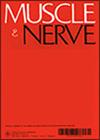Lower limb nerve ultrasound: A four-way comparison of acquired and inherited axonopathy, inherited neuronopathy and healthy controls.
IF 2.8
3区 医学
Q2 CLINICAL NEUROLOGY
引用次数: 0
Abstract
INTRODUCTION/AIMS In a recent study, we showed that nerve ultrasound of the upper limbs could distinguish inherited sensory neuronopathy from inherited axonopathy; surprisingly, no differences were found in the lower limb nerves. In this study, we compared lower limb nerve ultrasound measurements in inherited neuronopathy, inherited axonopathy, and acquired axonopathy. METHODS Tibial and sural nerve ultrasound cross-sectional areas (CSAs) of 34 healthy controls were retrospectively compared with those of three patient groups: 17 with cerebellar ataxia with neuronopathy and vestibular areflexia syndrome (CANVAS), 18 with Charcot-Marie-Tooth type 2 (CMT2), and 18 with acquired length-dependent sensorimotor axonal neuropathy, using ANOVA with post-hoc Tukey honestly significance difference (HSD) (significance level set at p < .05). RESULTS The nerve CSAs of CANVAS and CMT2 patients were not significantly different. Both the tibial and the sural nerve CSAs were significantly smaller in CANVAS and CMT2 compared with the acquired axonal neuropathy group. Tibial nerve CSAs of CANVAS and CMT2 were significantly smaller than controls. Tibial and sural nerve CSAs of the acquired axonal neuropathy group were also significantly larger than the controls'. DISCUSSION Ultrasound of the lower limb nerves distinguished inherited from acquired axonopathy with the nerve size respectively reduced and increased in these two groups. This has potential implication for the differential diagnosis of these diseases in clinical practice.下肢神经超声:获得性和遗传性轴索病、遗传性神经病和健康对照组的四项比较。
简介/目的在最近的一项研究中,我们发现上肢神经超声可以区分遗传性感觉神经病和遗传性轴索病,但令人惊讶的是,下肢神经却没有发现任何差异。在本研究中,我们比较了遗传性神经元病、遗传性轴索病和获得性轴索病的下肢神经超声测量结果。方法采用方差分析和事后Tukey诚实显著性差异(HSD)(显著性水平设定为P < .结果CANVAS患者和CMT2患者的神经CSA差异不大。与获得性轴索神经病组相比,CANVAS 和 CMT2 患者的胫神经和鞍神经 CSAs 均明显较小。CANVAS和CMT2患者的胫神经CSA明显小于对照组。讨论超声检查下肢神经可区分遗传性轴索病和获得性轴索病,两组患者的神经尺寸分别减小和增大。这对临床实践中这些疾病的鉴别诊断具有潜在的意义。
本文章由计算机程序翻译,如有差异,请以英文原文为准。
求助全文
约1分钟内获得全文
求助全文
来源期刊

Muscle & Nerve
医学-临床神经学
CiteScore
6.40
自引率
5.90%
发文量
287
审稿时长
3-6 weeks
期刊介绍:
Muscle & Nerve is an international and interdisciplinary publication of original contributions, in both health and disease, concerning studies of the muscle, the neuromuscular junction, the peripheral motor, sensory and autonomic neurons, and the central nervous system where the behavior of the peripheral nervous system is clarified. Appearing monthly, Muscle & Nerve publishes clinical studies and clinically relevant research reports in the fields of anatomy, biochemistry, cell biology, electrophysiology and electrodiagnosis, epidemiology, genetics, immunology, pathology, pharmacology, physiology, toxicology, and virology. The Journal welcomes articles and reports on basic clinical electrophysiology and electrodiagnosis. We expedite some papers dealing with timely topics to keep up with the fast-moving pace of science, based on the referees'' recommendation.
 求助内容:
求助内容: 应助结果提醒方式:
应助结果提醒方式:


